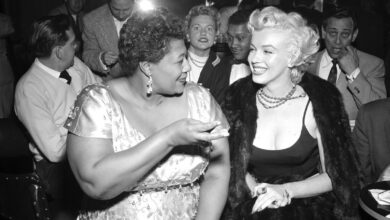‘Blonde’: The Long, Long History of Andrew Dominik’s Marilyn Monroe Biopic
Blonde, controversy and all, will be another bleak, beautiful work from Andrew Dominik.

Bad film biopics rank among the most rote of American film subgenres. What makes a film biopic bad? Oftentimes, it comes down to screenwriters simply deciding to bite off more than they can chew, narratively speaking. This typically manifests in the screenwriter’s decision to tackle the entire spectrum of a person’s entire life and/or career (Bohemian Rhapsody), though more successful biopics wisely limit their scope to one or two major accomplishments in the timeline of their subject (Steven Spielberg’s Lincoln, Love and Mercy). One upcoming biographical film that will be sure to get everyone talking is Andrew Dominik’s Marilyn Monroe feature Blonde, but the film has walked a long and winding road to finally get itself made and released.
By the time audiences are able to lay their eyes upon Dominik’s Blonde, the film may not even qualify as a conventional biopic. That Blonde exists at all, and after years and years of delays, is something close to a miracle. The to-be-released film is a long-gestating, sure-to-be-controversial biographical drama (so, not a biopic) about the life of Norma Jeane Mortensen, better known to most as screen legend Marilyn Monroe. Including Blonde, Dominik has directed only four non-documentary features, all of them incredible, since his 2000 breakout film, Chopper. That film was a giddily stylized, savagely funny study of the notorious convict-turned author Mark “Chopper” Reade, and how the man carried his prison mentality into the real world with oft-horrific consequences.
Dominik followed that explosive debut seven years later with another gloomy, far more poetic rumination on the self-mythologizing of an infamous outlaw. That would be the Malick-inspired The Assassination of Jesse James By The Coward Robert Ford, a folkloric death march of a movie starring Brad Pitt. A similar fate befell Dominik’s follow-up to his visually breathtaking revisionist Western: Killing Them Softly, an acrid, gloriously scummy return to the underworld that saw the Australian filmmaker adapting a novel by George V. Higgins into a simmering character piece with diegetic political speeches blaring in the background of every scene. The film was, by turns, talky, digressive, and unthinkably vicious. As a kind of anti-gangster yarn, Killing Them Softly seemed designed to repulse mainstream audiences, and yet the movie’s cynical perspective on America’s political machine has aged surprisingly well.

Dominik is an astonishingly talented filmmaker whose work often resonates with critics without reaching a broader commercial audience. He is an uncompromising artist first and foremost, consistently interested in subjects that some could describe as “difficult.” Over the years, Dominik has made it abundantly clear that he has little if any, interest in crossing over or capitulating to the demands of those who would want him to sand down his rough edges. In other words: Don’t expect the guy to do a Marvel movie anytime soon.
Having said all that, it feels perfectly reasonable to expect that Blonde, Dominik’s ultimate passion project, will be as challenging as any of his earlier pictures. If nothing else, let us look to the movie’s lengthy production period for evidence of how difficult it may have been for Dominik to bring this warts-and-all vision of Monroe’s life to the screen. The finished film that will premiere in theaters and on Netflix later this year will be one born of intense passion for and dedication to its source material: Joyce Carol Oates’ seminal novel about Monroe’s life, also titled Blonde.
Dominik had been discussing Blonde in interviews as far back as 2012, back when he was doing press for Killing Them Softly. The filmmaker insisted then that he was attracted to the psychological elements of Monroe’s life story, calling Blonde “an emotional nightmare fairy-tale type movie” about an “abandoned orphan who gets lost in the woods.” The director was also attached to other material at around that time, including a possible film adaptation of Cormac McCarthy’s Cities of the Plain that never materialized. All the while, Dominik remained committed to the idea of Blonde, even whilst knocking out a documentary about his musician pal and frequent collaborator, Nick Cave (One More Time With Feeling), in the meantime.

In her New York Times review of Blonde, writer Laura Miller calls Oates’ book “part Gothic, part kaleidoscopic novel of ideas, part lurid celebrity potboiler, and it is seldom less than engrossing.” This type of material would surely be catnip for Dominik, whose movies often deal with the intersection of public and private lives, trauma and celebrity, and the bright lights of success with the magnetic pull of darkness. Naomi Watts was attached to the project shortly after it was first announced, and in 2014, it was reported that Jessica Chastain, relatively fresh off of an Oscar nom for Zero Dark Thirty, would star as Monroe. Chastain, who delivered two of her best performances that year in Interstellar and A Most Violent Year, was an inspired if unconventional choice to play the siren who lit up movie screens in golden-age classics like Gentlemen Prefer Blondes and Some Like It Hot. Unfortunately, the actress ended up dropping out, leaving the sure-to-be-expensive production without a lead. Dominik and his collaborators soldiered on, in search of their Norma Jeane.
In 2019, the filmmakers would find just that when it was officially announced that Ana De Armas, her knockout turn in Rian Johnson’s Knives Out still on the horizon, would be confirmed to play Marilyn in Blonde. When photos emerged of De Armas made up to look just like the glamorous Hollywood icon, the resemblance was uncanny. Any murmurs of doubt were swiftly put to bed. Dominik also found the right partnership for Blonde when the film found itself at Netflix. The streaming giant has earned a reputation as a space where acclaimed, risk-taking filmmakers can craft their passion projects without interference or studio meddling (Roma and The Irishman are only two recent examples). Other cast members began to fill out the film’s ensemble: Adrien Brody as Arthur Miller, Bobby Cannavale as Joe DiMaggio (credited as The Playwright and The Ex-Athlete, respectively), with Julianne Nicholson, Toby Huss, and Dominik familiars Scoot McNairy and Garret Dillahunt occupying ancillary roles. Blonde, then, was a go, and will finally see a release this year.

Dominik has hinted that Blonde may be less dialogue-heavy than his earlier films; he’s even gone so far as to cryptically refer to the movie as “an avalanche of images and events.” Given that Oates’ book is particularly brutal in describing the cruel hardships of Monroe’s life, there is every reason to believe that Blonde will be a trying sit (Dominik has called his own movie “demanding”). One salacious rumor about a potentially un-filmable scene has been put to bed, although the movie has recently confirmed its NC-17 rating, and Dominik has taken time to acknowledge the inclusion of a particularly disturbing rape scene. Oates herself has praised Dominik’s adaptation, calling it “brilliant” and emphasizing the incongruity of a male director, particularly one known for deconstructions of macho genre fare, crafting a “feminist” take of the life of one of history’s most famous women.
There is speculation that Blonde may premiere out of competition at this year’s Cannes festival, and Netflix has already confirmed a substantial theatrical window for the movie. An official release date is still unconfirmed at this time (Blonde is being produced by Dominik’s frequent leading man, Brad Pitt, and his partners at Plan B Entertainment). Awards prospects? Let’s not get ahead of ourselves. What we can all be sure of is that Blonde, controversy and all, will be another bleak, beautiful, one-of-a-kind work from Andrew Dominik. That alone is reason enough to make it one of 2022’s most anticipated releases.





